
PHP Security
CS-422
(from The Linux Journal
Oct 2002
author: Nuno Lourereio)

Secure Web Applications
•Most security issues have to do with:
–hacker attacks
•denial of service
•server hijacking
–common threats
–compromise of data

Basic Rule
•Never trust user input
–Poorly or unvalidated user input constitutes the
most severe security problem with web
applications
•can crash a server
•can cause buffer overflows
–can allow machine to be hijacked
–allow hacker to have root access
–Assume user input is bad until you prove its OK

Global Variable Scope
•In versions of PHP earlier than 4.2.0 many external variables were
defaulted to global scope, variables couldn’t be trusted
<?php
if (authenticate_user()) {
$authenticated = true; }
…
if (!$authenticated) {
die (“Authorization required”) }
?>
If you set $authenticated to 1 via a GET:
http://example.com/admin.php?authenticated=1
the last test would pass, when it shouldn’t

Global Variable Scope (more)
Since PHP 4.1.0 register_globals has been deprecated; GET, POST, Cookie,
Server, Environment and Session variables are no longer in the global scope.
There are several new arrays to help developers writing applications:
$_GET, $_POST, $COOKIE, $_SERVER, $_ENV, $_REQUEST, $_SESSION
<?php
$_SESSION[‘authenticated’] = false;
if (authenticate_user( )) {$_SESSION[‘authenticated’] = true;}
….
If ($_SESSION[‘authenticated’]) { die (“Authorization required”);}
?>





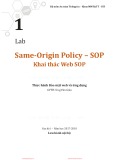
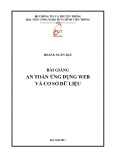
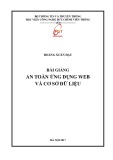
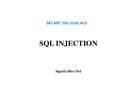
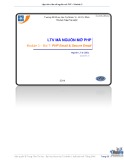










![Câu hỏi ôn tập An toàn mạng [năm hiện tại]](https://cdn.tailieu.vn/images/document/thumbnail/2025/20250702/kimphuong555/135x160/56191751442800.jpg)

![Cẩm nang phòng chống, giảm thiểu rủi ro từ tấn công Ransomware [Mới nhất]](https://cdn.tailieu.vn/images/document/thumbnail/2025/20250627/vijiraiya/135x160/48331751010876.jpg)



